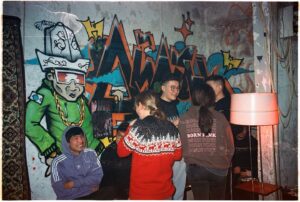Kyrgyzstan’s capital Bishkek is home to a small but vibrant metal scene. In the still largely traditional Kyrgyz society, local metal artists often struggle to find an audience, produce their music and get media attention. However, some leading figures in Bishkek’s metal scene are actively trying to promote the genre, both at home and abroad. One of these people is Alexander Degtyariov (32). He has been active in a large number of projects, produced a several albums with different bands and performs regularly in Bishkek and other places in Central Asia. His birthday festival in November 2023 attracted a large crowd of over 100 people who gathered at Bishkek’s favourite hangout place for metalheads: Bar56. Novastan spoke to metal pioneer Alexander about his life and career and the role of metal music in Kyrgyz and Central Asian societies.
“I first got into music when I was 14. I grew up in Tokmok, and back in the day that was a tough place. There were a lot of social issues, often connected to drugs. When I was in school, I started playing in a punk band. Later, a friend introduced me to a song from ‘Blur’. This resonated with me. I went online on a Kyrgyz forum to explore more music and found out that a lot of people were into one or the other of some mainstream bands, such as Metallica, ACDC, Black Sabbath and Slayer. I really liked those bands as well, but still felt like there was something missing, so I explored further.
Slowly I discovered other types of music, such as metalcore, grindcore, hardcore and melodic death metal. When I played this music for my friends, they would often shy away and say that it was too much for them. But I loved it. The louder it was and the more it provoked people, the more I liked it. I liked the anger.
When I was 16, a friend asked me to play in another band, but I found myself too old for this, as I thought that making music was something only the younger kids did. In the end he persuaded me to play after school for once. After this I kept coming back and started performing regularly.
From one band to another
In the past, there were very few metal bands in Kyrgyzstan. And those that performed only played covers. Soon after my first gigs, I started a band called Almagest. With Almagest I got to do my first big concert. It was an open-air concert for some 500 people. I loved the emotions and the energy of the crowd, how the crowd would turn into a single organism during the concert. With Almagest we also played in some local rock bars. Sadly we didn’t produce more than one single before the band split up.
Read more on Novastan: Darkestrah, a Black Metal Band from Kyrgyzstan
Around 2014, I really got into New York hardcore, but there was no-one who was playing it. I found out that supply creates demand: if you start playing something, people will come and listen to it. Some will not like it, but others will and they stick with you. That’s why I started playing more of the genre myself and founded a second band: Art of Gore. With Art of Gore we did a tour in Kazakhstan, but unfortunately our drummer got into some legal problems and we had to stop the project.
In 2016 I started yet another new project, Shahid, and another band called Devouring Genocide followed soon after. In-between I had a lot of other bands. I played every day. There is even a meme that has been going around about me starting new bands all the time.
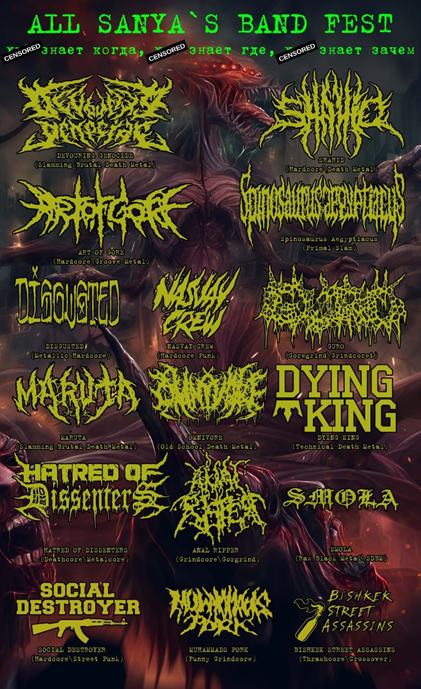
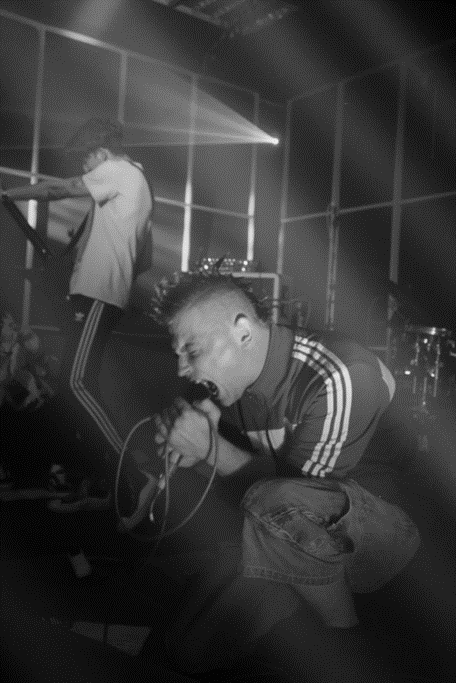
Clash of cultures
In general it has been tough making metal music in Kyrgyzstan. Often they think you’re a Satanist. There are two ways to be into metal in Kyrgyzstan: you have to be strong or you have to hide. It is a traditional country and sometimes people react badly. Also economically, it has been tough. Back in the days we didn’t have money for equipment. When I got my first guitar, I ate noodles for half a year to pay for it. We got our drums from the old Dom Kultura, the Soviet-era hangout place for the youth. A friend of mine managed to get his hands on a studio monitor, and then we started recording. We never had a proper studio and I think there still are no professional metal studios in Kyrgyzstan.
We play in our garages, basements or wherever we can. If you have a socket, some lamps, walls and a roof, you can play. Still, the economy keeps us small. When people have little money to spend, going to concerts is not their priority. Luckily there are several good venues where underground metal bands rehearse, and there have always been people who tried to make studios, clubs and concerts for the underground. We rely on these fanatics who support the local scene.
The way is up
Nowadays the situation is slowly improving. People are starting to get more money. Before we only had old Soviet and cheap Chinese instruments, but now we’re getting our hands on better stuff. The interest among the public is also growing. Metal is spreading because of the internet. The music doesn’t depend on nationality anymore, but it has become globalised. Kids just find out through TikTok. There is a new generation of musicians coming up, now that the guys who were listening to us as teenagers have started to understand the music and interpret it in their own ways. Technology also has made it cheaper for us to make music, as some of the production has become digital.
In Kyrgyzstan the scene is less noticeable than in Kazakhstan, especially Almaty. We often play there. The population is larger and the economy is more developed as well. When we struggled to find money to buy our equipment, the guys in Kazakhstan usually managed to get something better. The scene in Uzbekistan is also growing, since the country has been opening up under the current president. Previously everything there was underground, but soon they’ll be having their first big concert by a band from outside the region, The 69 Eyes from Finland.
Read more on Novastan: Kuturgan Fest – How Bishkek Becomes the Metal Capital of Central Asia
In our small scene, everyone knows each other and tries to help each other. Back when we started we had no-one to help us. Right now there are three of us who are more or less running the metal scene in Bishkek. Arseny Zherdev plays in KASHGAR, an ethnic black metal band. He does the large concerts and manages to get big bands from outside the region. A very important moment for everyone was when Sepultura, a Brazilian heavy metal band, came to Bishkek. We couldn’t believe that happened. Mikhail Efimenko focuses on the local established bands from Kazakhstan and Kyrgyzstan. He plays in MY OWN SHIVA, a metalcore band.
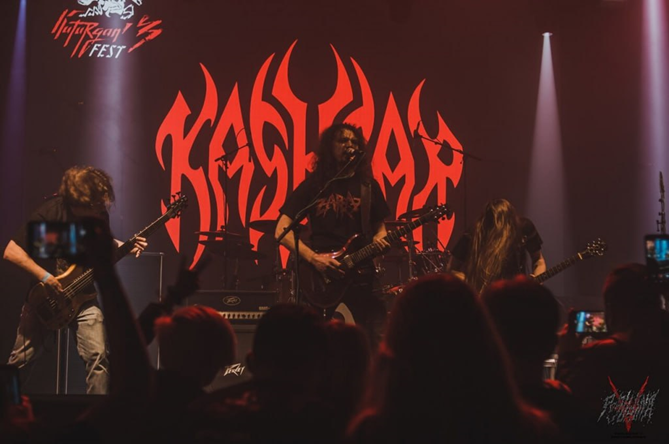
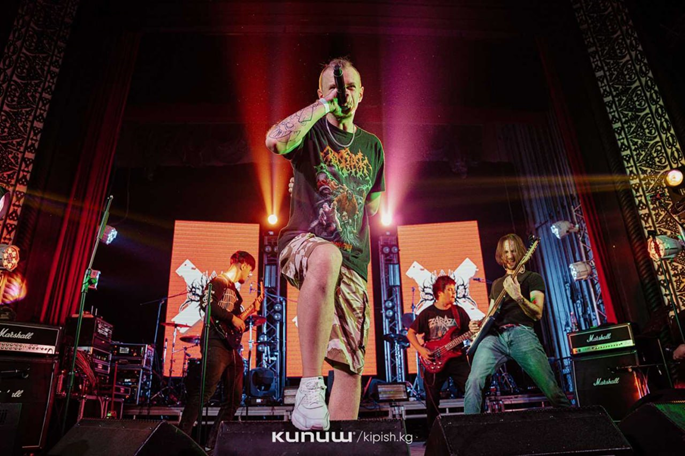
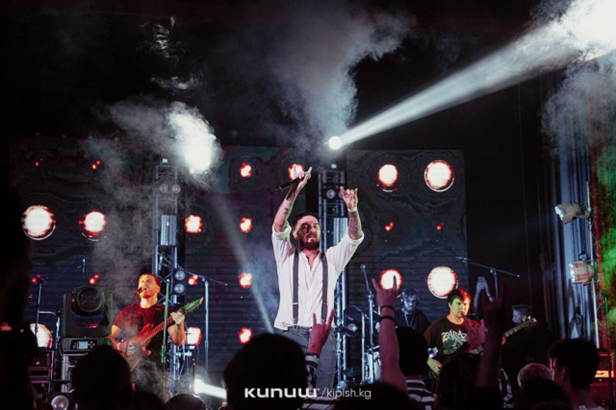
I only work with the underground people. For me it’s the emotion that matters. If a shaman starts banging a drum and wants to make metal, I will help him. My life philosophy is around supporting creativity. Whether you play a temir komuz, grindcore, punk, death metal or whatever – that’s all great by me. Just play. If I have the possibility to help, I will help.
Music connecting the world
Through my music I connect with people from outside the country, from all over the world. The first album of my band Shahid, Откровение (Revelations), was about social problems in Kyrgyzstan: crime, revolutions, street violence, hatred, family issues, poverty, drugs, and mental health problems. It was post-Soviet melancholy, post-Union noir. It was about doom. We don’t have a lot of opportunities in Kyrgyzstan. There has been a lot of instability.
In the album I needed to speak out. I didn’t expect anyone to understand this, but it turned out that people in the entire post-Soviet region think and feel the same way. People wrote me from Ukraine, from Belarus, from Kazakhstan, Russia and Poland. I even got a message from two guys from Canada. Even though my lyrics are only in Russian, they told me that they knew what I meant and how I felt. Then I understood that with globalisation, problems are the same all over the world. And when you sing about it, people everywhere will understand you.
For us, music is more than just a hobby. It is a way of life. We’re all getting a bit older now and we have work problems, family problems, social problems and other problems. We don’t make money when we play. On the contrary: we often pay to travel and perform. But this doesn’t matter to us. We’ll keep trying to help the locals who want to play, lend them guitars, drums, microphones – anything they need. We have no material interest in this, we’re just doing this out of our passion and ideals. And I keep performing as well. Soon, I will even play with Death before Dishonour (a hardcore band from Boston, USA) in Almaty. If you would have told me this five years ago, I would not have believed you.”
Photos are courtesy of the ROCK DA BONE festival in Bishkek
For more news and analysis from Central Asia, follow us on Twitter, Facebook, Telegram, Linkedin or Instagram.
 Inside Bishkek’s Metal Boom: Portrait of a Music Pioneer in Kyrgyzstan
Inside Bishkek’s Metal Boom: Portrait of a Music Pioneer in Kyrgyzstan 

